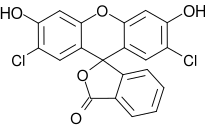Dichlorofluorescein
Dichlorofluorescein (DCF) is an organic dye of the fluorescein family, being substituted at the 2 and 7 positions by chloride.
 | |
| Names | |
|---|---|
| Preferred IUPAC name
2′,7′-Dichloro-3′,6′-dihydroxy-3H-spiro[[2]benzofuran-1,9′-xanthen]-3-one | |
| Identifiers | |
3D model (JSmol) |
|
| ChEBI | |
| ChEMBL | |
| ChemSpider | |
| ECHA InfoCard | 100.000.881 |
PubChem CID |
|
| UNII | |
CompTox Dashboard (EPA) |
|
| |
| |
| Properties | |
| C20H10Cl2O5 | |
| Molar mass | 401.20 g·mol−1 |
Except where otherwise noted, data are given for materials in their standard state (at 25 °C [77 °F], 100 kPa).
Infobox references | |
It is used as an indicator for argentometry by Fajans method.[1][2]
When used as an indicator, upon reaching the equivalence point of a titration reaction the color shifts from colorless towards a faint pink.
It is also used in the cellular antioxidant activity (CAA) assay. Dichlorofluorescin (DCFH) is a probe that is trapped within cells and is easily oxidized to fluorescent dichlorofluorescein (DCF). The method measures the ability of compounds to prevent the formation of DCF by 2,2'-Azobis(2-amidinopropane) dihydrochloride (ABAP)-generated peroxyl radicals in human hepatocarcinoma HepG2 cells.[3] By itself, dichlorofluorescin (DCFH) also quantifies intracellular hydrogen peroxide as well as cellular oxidative stress.[4]
References
- Kolthoff, I. M.; Lauer, W. M.; Sunde, C. J. (1929). "The Use of Dichlorofluorescein as an Adsorption Indicator for the Argentometric Titration of Chlorides". Journal of the American Chemical Society. 51 (11): 3273. doi:10.1021/ja01386a014.
- Bambach, Karl; Rider, T. H. (1935). "Volumetric Determinations of Halides: Use of Dichlorofluorescein as an Adsorption Indicator". Industrial & Engineering Chemistry Analytical Edition. 7 (3): 165. doi:10.1021/ac50095a012.
- Wolfe, K. L.; Liu, R. H. (2007). "Cellular Antioxidant Activity (CAA) Assay for Assessing Antioxidants, Foods, and Dietary Supplements". Journal of Agricultural and Food Chemistry. 55 (22): 8896–8907. doi:10.1021/jf0715166. PMID 17902627.
- LeBel, C. P.; Ischiropoulos, Harry; Bondy, S. C. (1992). "Evaluation of the probe 2',7'-dichlorofluorescin as an indicator of reactive oxygen species formation and oxidative stress" (PDF). Chem. Res. Toxicol. 5 (2): 227–231. doi:10.1021/tx00026a012. PMID 1322737.